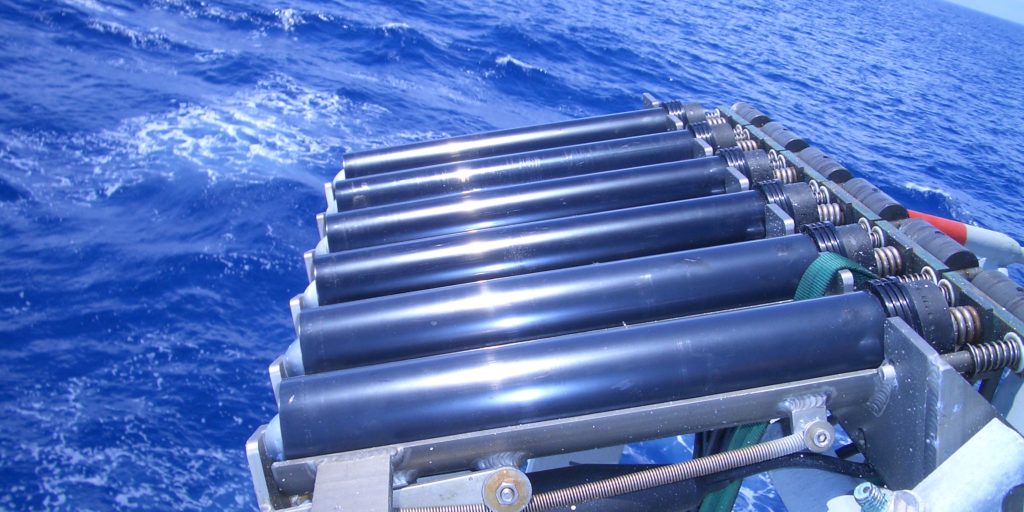- Chair(s)
- Catia Domingues (Australia) and Simon Good (UK) - formerly Matt Palmer (UK)
- Other Full Members
- TVS Udaya Bhaskar (India), Tim Boyer (USA), Marcela Charo (Argentina), Christine Coatanoan (France), Rebecca Cowley (Australia), Viktor Gouretski (Germany), and Shoichi Kizu (Japan)
- Associate Members
- Guilherme Castelao (USA), Lijing Cheng (China-Beijing), Mauro Cirano (Brazil), Alexander Vorontsov (Russia), Francis Bringas Gutierrez (USA), Katherine Hutchinson (South Africa), Sergio Larios (Mexico), Alison Macdonald (USA), and Toru Suzuki (Japan)
- Reporter
- Hans van Haren
- Terms of Reference
To develop, implement and document algorithms for assignment of “intelligent” metadata – i.e. an informed guess as to likely values for missing information – for temperature profiles where crucial metadata is missing.
To evaluate and document the most effective combination of automated quality control (AutoQC) procedures for temperature profile observations. International collaboration will be required for the design and coordination of benchmarking experiments using high-quality reference datasets.
To establish and implement a set of optimal automated quality control procedures, by reaching international community consensus and using the knowledge gained in the benchmarking tests from ToR-2 (above); to produce and publish a reference guide for best practices in automated quality control of ocean temperature profiles; and to develop and freely distribute an open-source quality control software toolkit to promote wide and rapid adoption of best practices by the oceanographic community.
To examine and document the feasibility of machine learning and other novel computational methods for enhanced quality control, to potentially minimize labor costs associated with human expert quality-control procedures.
To develop, implement and document internationally agreed best practice methods for assignment of uncertainty estimates to each temperature observation.
To freely disseminate (interim) versions of the IQuOD global temperature profile database (and added-value products) as it evolves over the next 3 years, in user-friendly file formats.
To share knowledge and transfer skills in instrumentation, regional oceanography, quality control procedures and data stewardship with international scientists in both developed and developing nations.
- Approved
- December 2015
- Financial Sponsors
- SCOR, NSF
- Meetings
3-7 October 2016 in Tokyo, Japan
16-18 April 2018 in Ostende, Belgium
28 October–1 November 2019 in Brest, France
October 2020 (online)
November 2020 (online)
October 2021 (online)
December 2021 (online)
March 2022 (online)
May 2022 (online)
June 2022 (online)
July 2023 in Potsdam, Germany
- Group Website
- http://iquod.github.io/
- Publications
IQuOD (International Quality-controlled Ocean Database) 5th Annual Workshop Report, April, 2018.
Castelao, G. (2020). A Framework to Quality Control Oceanographic Data. Journal of Open Source Software, 5(48), 2063. https://doi.org/10.21105/joss.02063
Palmer, M. D., Durack, P. J., Chidichimo, M. P., Church, J. A., Cravatte, S., Hill, K., Johannessen, J. A., Karstensen, J., Lee, T., Legler, D., Mazloff, M., Oka, E., Purkey, S., Rabe, B., Sallée, J.-B., Sloyan, B. M., Speich, S., von Schuckmann, K., Willis, J., & Wijffels, S. (2019). Adequacy of the Ocean Observation System for Quantifying Regional Heat and Freshwater Storage and Change. Frontiers in Marine Science, 6. https://doi.org/10.3389/fmars.2019.00416
Ponte, R. M., Carson, M., Cirano, M., Domingues, C. M., Jevrejeva, S., Marcos, M., Mitchum, G., van de Wal, R. S. W., Woodworth, P. L., Ablain, M., Ardhuin, F., Ballu, V., Becker, M., Benveniste, J., Birol, F., Bradshaw, E., Cazenave, A., De Mey-Frémaux, P., Durand, F., … Zhang, X. (2019). Towards Comprehensive Observing and Modeling Systems for Monitoring and Predicting Regional to Coastal Sea Level. Frontiers in Marine Science, 6. https://doi.org/10.3389/fmars.2019.00437
Meyssignac, B., Boyer, T., Zhao, Z., Hakuba, M. Z., Landerer, F. W., Stammer, D., Köhl, A., Kato, S., L’Ecuyer, T., Ablain, M., Abraham, J. P., Blazquez, A., Cazenave, A., Church, J. A., Cowley, R., Cheng, L., Domingues, C. M., Giglio, D., Gouretski, V., … Zilberman, N. (2019). Measuring Global Ocean Heat Content to Estimate the Earth Energy Imbalance. Frontiers in Marine Science, 6. https://doi.org/10.3389/fmars.2019.00432
Goni, G. J., Sprintall, J., Bringas, F., Cheng, L., Cirano, M., Dong, S., Domingues, R., Goes, M., Lopez, H., Morrow, R., Rivero, U., Rossby, T., Todd, R. E., Trinanes, J., Zilberman, N., Baringer, M., Boyer, T., Cowley, R., Domingues, C. M., … Volkov, D. (2019). More Than 50 Years of Successful Continuous Temperature Section Measurements by the Global Expendable Bathythermograph Network, Its Integrability, Societal Benefits, and Future. Frontiers in Marine Science, 6. https://doi.org/10.3389/fmars.2019.00452
Storto, A., Alvera-Azcárate, A., Balmaseda, M. A., Barth, A., Chevallier, M., Counillon, F., Domingues, C. M., Drevillon, M., Drillet, Y., Forget, G., Garric, G., Haines, K., Hernandez, F., Iovino, D., Jackson, L. C., Lellouche, J.-M., Masina, S., Mayer, M., Oke, P. R., … Zuo, H. (2019). Ocean Reanalyses: Recent Advances and Unsolved Challenges. Frontiers in Marine Science, 6. https://doi.org/10.3389/fmars.2019.00418
- Good, S., Mills, B., Boyer, T., Bringas, F., Castelão, G., Cowley, R., et al. (2023). Benchmarking of automatic quality control checks for ocean temperature profiles and recommendations for optimal sets. Front. Mar. Sci. 9, 1075510. doi: 10.3389/fmars.2022.1075510.
- Song, X., Tan, Z., Locarnini, R., Simoncelli, S., Cowley, R., Kizu, S., Boyer, T., Reseghetti, F., Castelao, G., Gouretski, V., & Cheng, L. (2024). DC_OCEAN: an open-source algorithm for identification of duplicates in ocean databases. Frontiers in Marine Science, 11. https://doi.org/10.3389/fmars.2024.1403175
SCOR Working Group 148
International Quality Controlled Ocean Database: Subsurface temperature profiles (IQuOD)
